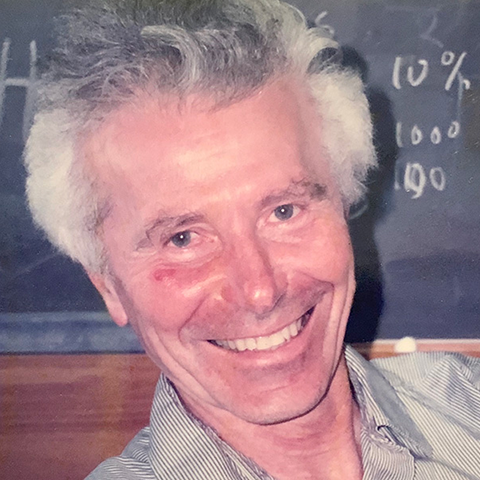In memoriam: Guido Guidotti
Guido Guidotti, a professor of biochemistry at Harvard University who studied the functions of proteins within membranes in transport and signal processing, died April 5 in Newton, Massachusetts. He was 87.

Born Nov. 3, 1933, in Florence, Italy, Guidotti spent most of his early life in Naples. After World War II, he visited Illinois as an American Field Service student. He returned to do premedical studies at Milliken College, then earned an M.D. at the Washington University School of Medicine in St. Louis. He was an intern and resident at Barnes Hospital before earning a Ph.D. in biochemistry from Rockefeller University. He took a position at Harvard in 1963 and remained there until his death.
In his early research, Guidotti used his own blood to determine the sequence and biochemical properties of hemoglobin before moving on to the study of membrane proteins. He identified structures and topologies of numerous proteins and enzymes as well as studying hormone regulation of membrane protein activity. He discovered that the protein CD39, in the cell membrane, hydrolyzes extracellular adenosine triphosphate, ensuring that this extracellular ATP is present at an appropriate concentration.
A member of the American Society for Biochemistry and Molecular Biology since 1968, Guidotti served on the editorial board of the Journal of Biological Chemistry from 1971 to 1976 and published 120 papers in the JBC. He also served on the editorial boards of the Journal of Membrane Biology and Molecular Biology of the Cell.
Nancy Kleckner, Guidotti's wife and a Harvard colleague, wrote in a remembrance, “From the perspective of the outside world, Guido's scientific work was seminally important in many respects … Guido's research was motivated only by his intellectual curiosity, his delight in figuring out how life works, and his joy in enabling the work and lives of the people he trained and with whom he worked. Scientific credit was not a priority.”
Enjoy reading ASBMB Today?
Become a member to receive the print edition four times a year and the digital edition monthly.
Learn moreGet the latest from ASBMB Today
Enter your email address, and we’ll send you a weekly email with recent articles, interviews and more.
Latest in People
People highlights or most popular articles

Embrace your neurodivergence and flourish in college
This guide offers practical advice on setting yourself up for success — learn how to leverage campus resources, work with professors and embrace your strengths.

Survival tools for a neurodivergent brain in academia
Working in academia is hard, and being neurodivergent makes it harder. Here are a few tools that may help, from a Ph.D. student with ADHD.

Quieting the static: Building inclusive STEM classrooms
Christin Monroe, an assistant professor of chemistry at Landmark College, offers practical tips to help educators make their classrooms more accessible to neurodivergent scientists.

Hidden strengths of an autistic scientist
Navigating the world of scientific research as an autistic scientist comes with unique challenges —microaggressions, communication hurdles and the constant pressure to conform to social norms, postbaccalaureate student Taylor Stolberg writes.

Richard Silverman to speak at ASBMB 2025
Richard Silverman and Melissa Moore are the featured speakers at the ASBMB annual meeting to be held April 12-15 in Chicago.

Women’s History Month: Educating and inspiring generations
Through early classroom experiences, undergraduate education and advanced research training, women leaders are shaping a more inclusive and supportive scientific community.
